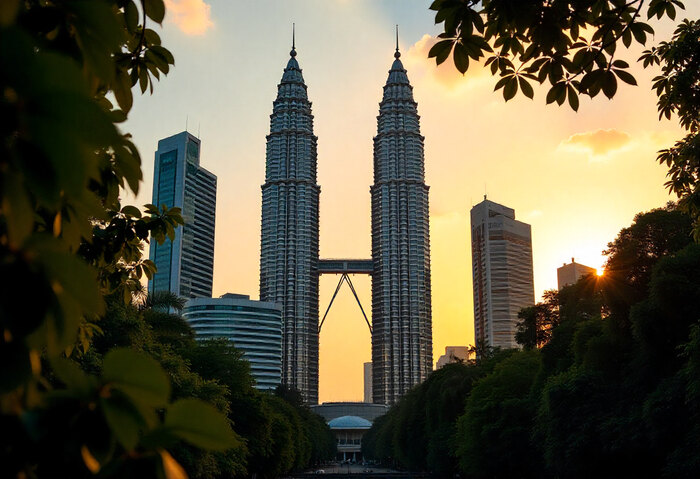≡-Malaysia’s Borneo, Kuching, and Sarawak Lead Sustainable Tourism Through Immersive Homestays, Culinary Markets, Cultural Villages, Eco-Friendly Practices, and Authentic Local Experiences – Viral of Today
<> Viral of Today <>
Home » Malaysia Travel News » Malaysia’s Borneo, Kuching, and Sarawak Lead Sustainable Tourism Through Immersive Homestays, Culinary Markets, Cultural Villages, Eco-Friendly Practices, and Authentic Local Experiences Published on
September 7, 2025Malaysia’s Borneo region, particularly Kuching in Sarawak, is rapidly emerging as a leader in sustainable tourism, offering travelers a unique blend of authentic experiences and responsible travel practices. The city’s commitment to eco-friendly initiatives is evident in its immersive homestays, where visitors live alongside local families and participate in traditional daily activities, learning firsthand the value of community-led sustainability. Kuching’s bustling culinary markets showcase the region’s rich flavors and locally sourced ingredients, highlighting how food culture can be both vibrant and environmentally conscious. Cultural villages bring the island’s heritage to life, preserving longhouses, traditional ceremonies, and indigenous crafts while educating visitors about centuries-old customs. Together, these initiatives demonstrate how Borneo balances modern tourism with cultural preservation and environmental responsibility, creating experiences that are as enriching for travelers as they are beneficial for the local communities and ecosystems.The aromas of Borneo’s kitchens captivate visitors from the moment they enter. Fragrant garlic and pepper blend seamlessly with the sharp tang of Terung Iban, a sour eggplant unique to the island, while the deep caramel notes of palm sugar complement crisp fried potato wedges. Each meal tells a story of local ingredients, centuries-old techniques, and a culinary tradition that celebrates balance. Sweet, sour, and spicy flavors often meet in a single bite, creating a sensory experience as intricate and vibrant as Borneo itself.Yet, the allure of Borneo extends far beyond its food. In Kuching, the capital of Sarawak, sustainability is not just a goal—it is a way of life. From sourcing ingredients directly from the rainforest to supporting initiatives that preserve cultural traditions, the city demonstrates how tourism can thrive while safeguarding natural and social resources. Here, sustainability is woven into daily routines, ensuring that the growth of tourism respects both the environment and local communities.Celebrating Tradition at Sarawak Cultural VillageA striking example of sustainable practice is the Sarawak Cultural Village, a 17-acre living museum that showcases the island’s rich ethnic diversity. Visitors can explore meticulously recreated traditional dwellings, including Iban, Bidayuh, and Orang Ulu longhouses, as well as Chinese farmhouses, Melanau tall houses, and Malay residences. Each structure offers an authentic glimpse into the architectural and cultural heritage of Borneo, immersing guests in the island’s past.The village is far more than a static display. Daily performances of music, dance, and traditional ceremonies bring the culture to life, providing visitors with a tangible understanding of how communities once lived and thrived. Through interactive experiences, guests learn about communal living, defense strategies, and ceremonial customs, all while gaining an appreciation for the importance of preserving cultural identity. The village’s dynamic approach ensures that Borneo’s traditions continue to resonate with modern audiences.Homestays That Connect Visitors to Local LifeFor travelers seeking deeper immersion, homestays in remote regions of Borneo offer unparalleled insight into everyday life. Guests live alongside local families in traditional homes, participating in farming, cooking, and daily activities that have been maintained across generations. Terraced hillsides dotted with pineapples coexist with wild herbs, ferns, and spices, reflecting a way of life that remains closely aligned with nature.Accommodations are simple, featuring bamboo structures, shared facilities, and minimal modern conveniences. Meals focus on rice, local fish, and foraged greens, enhanced with native spices. These homestays provide not only an authentic travel experience but also economic support for local communities, encouraging the preservation of cultural practices and sustainable ways of living.Hands-On Culinary SustainabilityKuching’s markets offer a sensory introduction to Borneo’s unique culinary ecosystem. Exotic fruits, vegetables, and herbs—many found nowhere else in the world—line the stalls alongside familiar staples like fresh fish and fried treats. Visitors can select ingredients for immersive cooking sessions, learning to combine garlic, onions, coconut milk, and local spices into flavorful meals while practicing zero-waste techniques.Sustainability in Borneo extends beyond careful ingredient selection. Leftovers are repurposed or donated, while culinary spaces also act as hubs for local artisans and creative initiatives. This approach illustrates that true sustainability encompasses both environmental stewardship and social responsibility, supporting cultural continuity alongside ecological care.Gradual Steps Toward a Sustainable FutureIn Sarawak, sustainability grows incrementally rather than through sweeping reforms. Small-scale projects led by businesses, cultural institutions, and community organizations collectively create a framework where tourism and conservation coexist. Each effort strengthens the region’s commitment to authentic experiences, environmental care, and cultural preservation.Though Kuching may not yet rank among the world’s top sustainable tourism destinations, its thoughtful, steady progress signals the long-term potential of the area. By integrating sustainable practices into every aspect of daily life—from kitchens to markets to cultural sites—Borneo is quietly establishing itself as a leading model for responsible tourism in Southeast Asia. Visitors enjoy rich and authentic experiences while contributing to the preservation of the island’s natural and cultural treasures for generations to come.
This information will surprise you!
See also
- Read until the end to discover everything.
- Important information you need to know.
- Interesting facts and helpful tips.
Conclusion
Did you enjoy the news? Keep following us daily!













